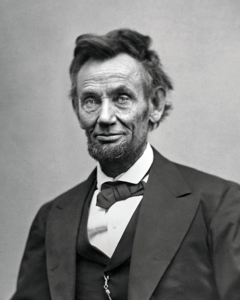
When I started assembling my list of Authority Archetypes — the thought leaders who would represent the recurring authority strategy patterns I’ve spotted over the past several hundred years — Abraham Lincoln was at the top of my list.
Lincoln is the only Authority Archetype political figure, and for good reason: he has very broad appeal. His name and likeness have been used to promote a number of companies and political issues since his death in 1865. There have been more books written about Lincoln than any other human being in history save one man — Jesus Christ; who, incidentally, is the other person who represents the “Messiah” strategy (sometimes colloquially referred to as the “sell it by zealot” strategy).
It may seem incongruous, if not entirely sacrilegious, to put Lincoln and Jesus in the same category. And while I agree with some of those concerns, take note of their similarities: both led people, both faced difficult tasks, both dealt with expunging sin from society, both seemed to be aware of their place in history, and both were martyred on Good Friday. For Lincoln, layer on top of that the quintessential “American Dream” story of success from a hardscrabble beginning and strong themes of self-development and self-reliance. You can’t really point to anyone else responsible for his success, except, perhaps, his wife Mary.
Since his death, Lincoln has remained a top-ranked President and American hero…
But it wasn’t always like that.
Prior to his run for the White House in 1860, Abraham Lincoln had the reputation of a political born loser. Although he was moderately successful as a lawyer, he made a number of career missteps. For example, he exited the Black Hawk War as a lowly private… after entering the Army three months earlier at the rank of Captain. A newspaper editorial in 1857 stated that “Lincoln is undoubtedly the most unfortunate politician that has ever attempted to rise in Illinois. In everything he undertakes, politically, he seems doomed to failure.”
Lincoln himself seemed to agree, telling his best friend Joshua Speed that he had done nothing to make any human being remember he had ever lived. He told his third law partner, William Herndon, that it was hard facing the prospect of dying without leaving the country any better than it was when he had been born. As he faced his lack of accomplishment and success in his mid to late forties, one could argue he was having a mid-life crisis.
But in the late 1850’s, something remarkable happened. Lincoln seemed to experience a rebirth. With the Lincoln-Douglas debates and a rousing speech at Cooper Union in New York City, his star seemed suddenly on the rise. That ascent would carry him into the White House and secure his place in history for all time.
What happened? Why the sudden change in his fortunes?
I suggest that Abraham Lincoln discovered what I call his “Hundred Year Purpose,” a legacy that would still have an impact on the world a hundred years later. In Lincoln’s case, it was the dual purpose of holding the union together and the abolishment of slavery; first in the territories, then in the States.
A friend and mentor of mine recently asked me about my Hundred Year Purpose. I hesitated before answering — not because I didn’t know what to say, but due to the sheer enormity of the question. Since I plan on being dead 100 years from now, he was really asking me, what am I doing with my life (specifically, my career) that will outlive me? How am I making the world a better place 100 years from now?
As a Thought Leader (and indeed, a human being), it’s crucial for you to recognize your hundred year purpose and to say it out loud, repeatedly. You’ll develop a specific vocabulary around it, a set of ideals, and an emotional connection with people that agree with it. These are strategic actions that don’t normally happen on their own, so I work with experts to make it happen. They are often surprised at the appeal and “stickiness” of their own ideas when strategically communicated.
When clearly and correctly enunciated, your hundred year purpose will resonate with the right people, chase off the wrong people, and help create a values and philosophy alignment that will help them stick with you for years, driving up their value as an audience.
NOTE: This blog post originally appeared as an article in a preview issue of the new Authority Gold Newsletter. To get your own complementary preview subscription, go to educatedauthority.com/newsletter.